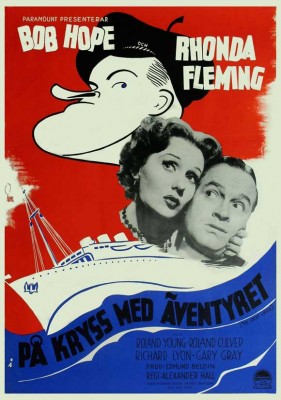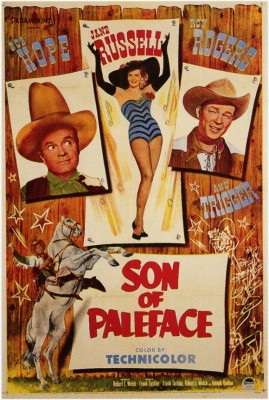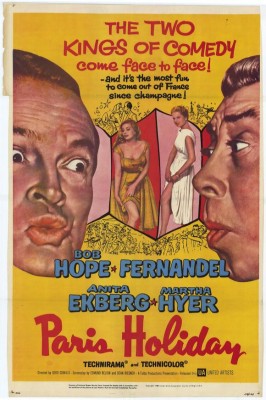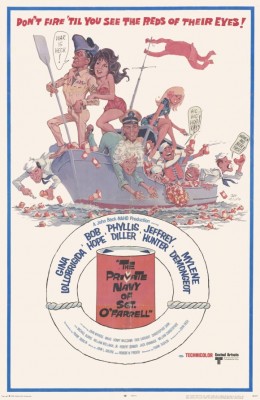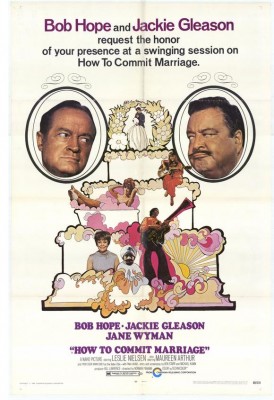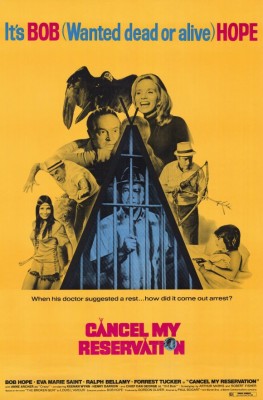| Reviews & Columns |
|
Reviews DVD TV on DVD Blu-ray 4K UHD International DVDs In Theaters Reviews by Studio Video Games Features Collector Series DVDs Easter Egg Database Interviews DVD Talk Radio Feature Articles Columns Anime Talk DVD Savant Horror DVDs The M.O.D. Squad Art House HD Talk Silent DVD
|
DVD Talk Forum |
|
|
| Resources |
|
DVD Price Search Customer Service #'s RCE Info Links |
|
Columns
|
|
|
Bob Hope Collection - Volume 2 (Great Lover / Son of Paleface / Paris Holiday / Cancel My Reservation...and More!), The
Video & Audio
First things first: somebody goofed, big time. The back cover text promises "wonderful high-definition transfers" and lists the four later films as being in 16:9 enhanced widescreen on both the back cover and on the discs themselves. Unfortunately, that's just not the case. Paris Holiday, filmed in Technirama, is 16:9 enhanced but not a very good transfer considering that wide-frame format's potential, and the last three films are all full-frame transfers from less than pristine film sources. (Fortunately, the last three were shot open-matte for 1.85:1 projection, and fare okay zoomed in on widescreen TVs.). Son of Paleface, previously released by BCI/Eclipse in a superb high-def transfer (on HD DVD format only, alas) looks fine on DVD, but even The Great Lover, a black and white, 1.37:1 movie, is downright awful, like a public domain release. For the record, the six films are spread across three single-sided, dual-layered discs.
The reason for all this is unclear. Originally released by a variety of studios, apparently the rights to all these films eventually reverted to Bob Hope. It appears Hope (or later on, his estate) licensed or sold these films to Columbia Pictures Television and/or Fremantle Media, a London-based conglomerate. Shout! Factory may have been promised "wonderful high-definition transfers," but what they got was third-rate material. Maybe some of these will eventually come to Blu-ray.
Rhonda Fleming, her dress torn and giving Bob a come-hither look: "I need you ... to thread that needle!"
The Great Lover - first announced as My Favorite Redhead - is a fast and funny Hope vehicle aided by a better than usual story, its plot reminiscent of The Lady Eve (1941), with Hope involved with a beautiful but poor duchess and a cardsharp-serial murderer while on a transatlantic cruise. (The screenplay is credited to Melville Shavelson, Jack Rose, and producer Edmund Beloin.) Hope plays Freddie Hunter, whose Boy Foresters (read: Boy Scouts) have won a trip to Paris. Naturally Freddie is anything but the ideal scoutmaster, and once onboard he's instantly lusting after the beautiful but broke Duchess Alexandria (Rhonda Fleming), who with the Grand Duke Maximillian (Roland Culver) are looking for a wealthy American to stave them off from financial ruin.
As with all of Hope's best comedy-thrillers, this one carefully lays the groundwork for what's to come in a straight opening scene. Handsome playboy Williams (future TV Superman George Reeves) realizes he's been duped by mild-mannered cardsharp C.J. Dabney (Roland Young). Williams thinks he's got Dabney over a barrel but Dabney unexpectedly strangles Williams with a knotted handkerchief instead. Later, setting his sights on Maximillian, Dabney uses Freddie as his patsy, passing him off as an American millionaire. This sets up Dabney's later attempts to do in Freddie, which really pay off.
Though arguably overloaded with potential comedy - the Boy Foresters really come off as superfluous - The Great Lover is solidly constructed with good laughs all the while, and at 79 1/2 minutes never wears out its welcome. Roland Young (The Man Who Could Work Miracles, the "Topper" films), as he almost always was, is a delight and, somewhat unusually, both comically and genuinely threatening at once as the outwardly mousy serial killer. Indeed, Hope and Young play so well off one another it's a shame they made no other films together.
Jim Backus, in one of his first onscreen roles, has a good supporting role as a detective on Dabney's trail, while Jack Benny has an amusing cameo. (**** out of *****)
"Where I hail from, we don't cotton to folks what cotton to other folks' gals that don't cotton to folks that cotton to them. That's cotton talk, see?"
Even better than The Paleface (1948), Frank Tashlin's loosely connected Son of Paleface may be Hope's all-time best comedy, with Tashlin (who co-wrote but did not direct the original) refining the art of the Western spoof with good songs ("California Rose," "Four-Legged Friend," and it introduced "Buttons and Bows") along the way. As he would do again with Road to Bali Tashlin really cuts loose, infusing the picture with wild, cartoon-like sight gags.
Hope plays Peter "Junior" Potter, Jr., the equally cowardly and lascivious son of his Paleface character; Jane Russell, who was Calamity Jane in The Paleface, has even more fun here as "Mike" Delroy, whose alter-ego is the infamous masked bandit known only as "The Torch." Maureen O'Hara reportedly was offered the part but turned it down, yet it's hard to imagine her as appealingly sassy and sexy in quite the way Russell is in this.
And there are two significant additions: Roy Rogers as government agent Roy Barton, and his beloved horse, Trigger, "the Smartest Horse in the Movies," as himself. Rogers (with wife and frequent co-star Dale Evans) had just completed Pals of the Golden West (1951), his last-ever B-Western for Republic Studios, and had only recently embarked on his hugely popular TV show. Roy Rogers (and for that matter, Trigger) was positively adored by several generations of children and adult fans of singing cowboys, and the film never is condescending toward Rogers's clean-cut screen persona. It smartly, almost poignantly allows him to essentially play the same character he'd been playing in his films with Republic. He's wonderful here, delighting longtime fans and newcomers alike.
The terrific cast includes Douglass Dumbrille, Harry von Zell, Iron Eyes Cody, "Wee Willie" Davis, dancer Sylvia Lewis, Jean Willes, Jerry Mathers, and as a photographer, Cecil B. DeMille. (**** 1/2)
"Do you know it's mating season for shellfish? Maybe the lobsters are having a hayride tonight!"
It runs out of steam long before it's over, but Paris Holiday is one of Hope's most interesting, mainly for its cast and superb use of Parisian location along with some flawlessly done art direction in the studio, apparently also in Paris.
Aboard the SS Île de France, famous American comedian Bob Hunter (Hope) meets iconic French clown Fernydel (Fernandel). He also falls for Ann McCall (Martha Hyer), a Paris-based American diplomat, while voluptuous secret agent Zara Brown (Anita Ekberg) tries to seduce him.
Hunter is en route to Paris hoping to secure the American rights to the latest play by Serge Vitry (Preston Sturges), in which Hunter wants to star. However, Vitry's play is in fact a veiled exposé about a real-life counterfeiting ring whose leaders are at the highest levels of the French government. Zara and others, believing Hunter has a copy of the play, or something, are out to assassinate him, and when that doesn't work they try to have him committed to an insane asylum. (A doctor reassures him, "We have many actors here. Especially since television.")
The idea of putting America's and France's most-popular comedians together in the same movie is pretty irresistible. Their comic styles aren't really compatible, but someone had the good sense to let each comedian do his own thing and they seem to be enjoying each other's clowning when they're together. (When they first meet, Fernandel admires Hope's famous ski-slope nose to which Hope responds, "And that's comin' straight from the horse's mouth!" a reference to Fernandel's trademark: equestrian-like choppers.) In one scene Fernandel even briefly disguises himself as a priest, a reference to his famous Don Camillo character and films.
The great comedy writer-director Preston Sturges made short gag appearances in a few movies but this, his last film credit in any capacity, was the only real movie role, a small but pivotal part. He was only in his late-50s but looks tired and a good 15 years older at least, but his appearance is still almost touching, as is Hope's admiringly delivered line "I've seen most of your comedies."
Filmed in Technirama, a wide-frame process similar to VistaVision, as its title suggests Paris Holiday has a strong travelogue-type appeal. The footage in Paris really glamorizes the city well, much like Stanley Donen's Funny Face, which was shot there (in VistaVision) at about the same time. The footage set aboard the SS Île de France is likewise lush and exotic. (The ship was decommissioned soon after filming but used one last time, for the exciting disaster film The Last Voyage in 1960.) Apparently the picture was made entirely in France - some of the shipboard and later hotel scenes were done at a studio on sets, but the art direction is so good it's often impossible to tell what's a set and what's a real on-location interior.
The picture has several big comic set pieces, including an elaborate car and helicopter chase at the end featuring some incredible stunt work. But the biggest laugh may be the casting of British-born André Morell as an American ambassador, whose American accent is one of the most surreal ever attempted. (***)
"This is absolutely my last war!"
By far the worst film of this set, The Private Navy of Sgt. O'Farrell is an appallingly sloppy, aimless comedy set on a sleepy Pacific Island during World War II. The film has almost no story to it, and with critics seems to rate better than Hope's Cancel My Reservation solely because it was directed by the once-great Frank Tashlin, whose last film this was. The former animator who brought his cartoon sense to such deliriously over-the-top comedies as The Road to Bali and The Girl Can't Help It had in recent years been slumming with Jerry Lewis (The Disorderly Orderly, etc.) This is far worse than even Tashlin's worst movie with Jerry.
What plot there is mostly involves M/Sgt. Dan O'Farrell's (Hope) efforts to retrieve a desperately needed cargo of Pabst Blue Ribbon beer, lost at sea when the ship carrying the brew was torpedoed. O'Farrell schemes to find the thousands of missing cans, which turn up near a reef on the uninhabited side of the island. Uninhabited, that is, save for Calvin Coolidge Ishimura (Mako), a Japanese-American drafted into the Japanese Imperial Army during an ill-timed visit to Tokyo just as the war broke out. At the time, O'Farrell was at Pearl Harbor, torn between duty and his love for Italian bombshell Maria ("Miss Gina Lollobrigida," as she's billed in the credits).
But wait - there's more. Lt. Lyman P. Jones (Jeffrey Hunter) is a mama's boy inexplicably mad about banshee-like, man-hungry nurse Nellie Krause (Phyllis Diller). In an alarming dream sequence, Jones fantasizes he's Adam to Krause's Eve, with comedian Diller naked if mostly covered in a long wig. In another crazy subplot leading nowhere Capt. Elwood Prohaska (Dick Sargent) is secretly writing O'Farrell's inspiring life story!
The film seems to have been inspired by the success of military comedies on TV, specifically McHale's Navy and Hogan's Heroes. William Christopher (M*A*S*H) and John Myhers, as a private in O'Farrell's platoon and his commanding officer, respectively, were both frequent guests on Hogan's Heroes, if that's any clue. Probably also the film was seen an offshoot of Hope's USO shows in Vietnam. The picture has the cast and loose structure of those live shows, and except for Mako's presence it never once accurately reflects its period, instead looking like something set and filmed in the late-1960s.
It's virtually laughless, but one-of-a-kind Diller comes off well through sheer force of energy and audaciousness. Precious little of Tashlin's trademark humor is present. A spoof of From Here to Eternity doesn't come off, and the best gag has the crew of a Japanese submarine speaking English with, briefly, Japanese subtitles. (* 1/2)
"I never thought I'd miss the Beatles!"
A slight improvement over The Private Navy of Sergeant O'Farrell, How to Commit Marriage (1969) nonetheless is a pretty misbegotten effort by executive producer Hope to bring his persona up-to-date. There are weak jokes about student protests, late-'60s rock music, and free love, but the end results are about as hip as Dragnet: 1969. Teaming Hope with Jackie Gleason was a fine idea but they don't really gel: Hope is listless and unfunny while Gleason is animated and amusing, despite the weak material given him.
The film starts promisingly, with Elaine Benson (Jane Wyman) telling her L.A.-based realtor husband, Frank (Bob Hope), that she wants a divorce. The couple is getting ready to go their separate ways when 19-year-old daughter Nancy (JoAnna Cameron) returns home from Berkeley unexpectedly to announce her engagement to 20-year-old music student David Poe (Tim Matheson, in his screen debut).
David is the estranged son of famous pop music promoter Oliver Poe (Jackie Gleason), who holds a grudge against Frank after he sold him land quickly washed away in a mudslide. Oliver fouls up the wedding and the young couple decides to live together "in sin," traveling with one of Oliver's rock band clients, The Comfortable Chair (The Comfortable Chair), and the group's Hindi mystic, the Baba Zeba (Professor Irwin Corey, inarguably novel casting), a character obviously inspired by Maharishi Mahesh Yogi.
Rather disconnectedly, Frank and Elaine meanwhile start new relationships, she with recently divorced Phil Fletcher (Leslie Nielsen), he with Lois Grey (Maureen Arthur). Oliver, for his part, has a voluptuous girlfriend in model LaVerne Baker (former Ginger Tina Louise). Nancy gets pregnant, puts the baby up for adoption and Frank and Elaine are pulled back together as they essentially kidnap and try to adopt the baby for themselves.
The movie is all over the map, and Hope looks decidedly disinterested; he's livelier in The Private Navy and his next film, Cancel My Reservation. Conventional wisdom is that around this time Hope was more involved with his television specials, charity work, and entertaining the troops in Vietnam, and that his film career suffered. That certainly appears to be true here. Gleason, contrastingly, gives a spirited performance as Oliver, at one point criticizing a band in the studio because "It sounds like music and I can understand every word!" The film tries everything short of the kitchen sink to generate laughs but almost nothing does. There's even an extended sequence with Hope and Gleason playing golf with, for no clear reason, a baby chimpanzee. (**)
"Now if I could just get that dead girl off my mind I could make it to dreamland!"
Cancel My Reservation, Hope's last starring film, isn't quite as dreadful as its reputation though the laughs are few and far between, and the best gag involves Keenan Wynn and Doodles Weaver with Hope nowhere in sight. What's most odd about the picture is that despite Hope's age (he was 69 when it was released) and times that were a-changin', Cancel My Reservation is very much like a 1942 Bob Hope comedy that just happens to have been made in 1972. The jokes are the same except the topical references are to things like burning bras instead of buying war bonds.
Adapted by Bob Fisher and the late Arthur Marx (Groucho's son) from of all things a Louis L'Amour novel, The Broken Gun, Cancel My Reservation stars Hope as Dan Bartlett, a famous New York-based TV talk show host. Recently Dan has been feeling threatened because his wife, Sheila (Eva Marie Saint), has become a Kathie Lee Gifford-type fixture on the program to his Regis Philbin and, needing a break, he heads to Arizona for a vacation.
However, soon after his arrival the murdered corpse of a young Native American is found in his car, and Sheriff "Houndtooth" Riley (Keenan Wynn) and Deputy Cactus (Doodles Weaver) arrest him. It's immediately apparent that wealthy John Ed (Ralph Bellamy) and his henchman, Reese (Forrest Tucker) are behind the killing - they're trying to swindle the local reservation out of land rightly theirs, hence the movie's title.
Of course it takes 90-plus minutes for Dan and Shelia, who soon comes to his aid, to figure all this out, even with the help of John Ed's stepdaughter "Crazy" Hollister (Anne Archer, in her second movie role), who suspects him in her mother's death. Despite the title the Native American aspect of the story is very slight, even with Chief Dan George (Little Big Man) in a few scenes, and Henry Darrow as Joe Little Cloud. "Joe Little Cloud?" Dan asks, "With a name like that we'd probably find the weather bureau!"
Cancel My Reservation is tepid and completely out of step with the times, especially when one considers that by this time Woody Allen was essentially emulating Hope's persona yet subverting it simultaneously. Though Hope was pushing 70, his character is identified in one scene as being 42 years old. For his age Hope is surprisingly agile and his timing is still spot-on but he makes a pretty broken-down 42-year-old.
Since the 1940s, Hope's comedies have been brightened by star cameo appearances, which are often clever and even sometimes further the plot. In Cancel My Reservation there's a sequence where Dan images himself about to be hanged, and in the audience are Bing Crosby, John Wayne, Johnny Carson, and Flip Wilson. But this time the cameos fall completely flat.
The best joke doesn't involve Hope at all: Back at the station, Sheriff Riley (Wynn) opens his locker and on the inside door is an 8 x 10 portrait of John Wayne. Moments later Deputy Cactus opens his locker, and on the inside door is an 8 x 10 portrait of Gabby Hayes. Now that's funny. (** 1/2)
Extra Features.
None.
Parting Thoughts
Despite the awfulness of the three later Hope comedies, I was really looking forward to the entire set - until I saw the third-rate transfers on everything save Son of Paleface. These movies - yes, even The Private Navy of Sergeant O'Farrell - deserve better. Still, the morbidly curious may, like this reviewer, find the later films of some interest, while the three earlier titles are all worthwhile and funny. Rent It.
Stuart Galbraith IV's audio commentary for AnimEigo's Tora-san, a DVD boxed set, is on sale now.
|
| Popular Reviews |
| Sponsored Links |
|
|
| Sponsored Links |
|
|
| Release List | Reviews | Shop | Newsletter | Forum | DVD Giveaways | Blu-Ray | Advertise |
|
Copyright 2024 DVDTalk.com All Rights Reserved. Legal Info, Privacy Policy, Terms of Use,
Manage Preferences,
Your Privacy Choices | |||||||









